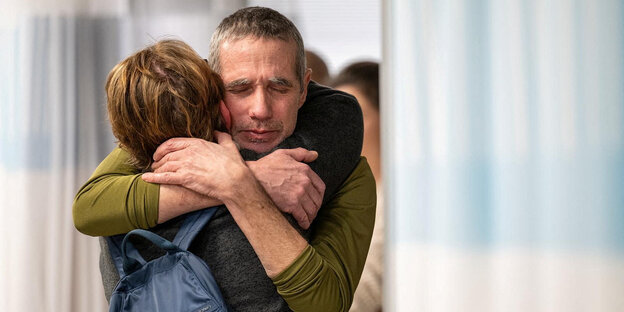The Israeli army frees two men from Hamas. Family members continue to demand a negotiated solution.

Fernando Simón Marman, one of the two released Israeli hostages, reunites with his relatives Photo: Israel Defense Forces/handout via Reuters
JERUSALEM taz | Fernando Marman and Louis Har look exhausted and relieved as they hug their family after 128 days held hostage by Hamas. The images of the men in their 60s and 70s, freed during a special operation in the southern Gaza Strip, surrounded by their families, will be broadcast on all television channels on Monday. For the first time in about two and a half months, hostages are returning alive from the terrorist group's violence in Gaza. Despite the success of the action, the relatives of those released continue to demand a negotiated solution.
At 1:49 a.m., fighters from the border police's elite Jamam unit stormed a “civilian building in a civilian neighborhood” in Rafah, according to the Israeli military. The hostages were freed “amid intense firefights in several places with numerous terrorists,” said army spokesman Daniel Hagari. Therefore, the operation was carried out on the basis of intelligence information and with the support of air strikes. According to Palestinian information, dozens of Palestinians were killed, including women and children. A journalist from the AP news agency confirmed the arrival of several bodies at the Abu Yussef al-Najar hospital.
Defense Minister Joaw Gallant praised the operation on the online platform and spoke of “an impressive rescue operation.” Marman and Har were taken to Sheba Hospital near Tel Aviv. According to initial investigations, both are in “good and stable” condition.
Prime Minister Benjamin Netanyahu sees the deployment as confirmation of his adamant continuation of the war. In the morning he congratulated the emergency services and reiterated: “Only by maintaining military pressure until total victory will the release of all our hostages be achieved.”
Continue calls for diplomacy
The former head of the Jamam unit, reserve Maj. Gen. David Tsur, called for continued focus on a diplomatic solution despite the successful liberation. “When we see a military opportunity, we must seize it, but we must also take advantage of every opportunity to advance negotiations,” Tsur said. “There can’t be one thing or the other.” Any military action endangers the lives of the hostages, as well as those of the emergency services.
Last week, Hamas responded to a US-brokered proposal with far-reaching demands. Among other things, the group wants a 135-day ceasefire, followed by a permanent ceasefire and a withdrawal of Israeli soldiers from the Gaza Strip. The head of government of Israel rejected this proposal. Tsur calls the demands “incomprehensible.”
Louis Har's son-in-law, Idan Bejerano, thanked him in the morning for the rescue: “But the work is not over yet,” he told reporters near the hospital. Israel's leaders would have to reach an agreement. “We will not stop until all the hostages are free,” the 36-year-old said. There are still around 130 kidnapped in Gaza; according to the military, at least a fifth of them are no longer alive.
Meanwhile, concerns continue to grow over an Israeli offensive in Rafah, where around 1.5 million people are suffering from catastrophic conditions. Despite clear warnings from many aid organizations and allies, including Germany and the United States, the Israeli military said it was continuing its airstrikes on the city of Rafah on Monday.
Phone call between Biden and Netanyahu
On Sunday night, US President Joe Biden and Netanyahu spoke by phone for the first time in more than three weeks. According to a senior US representative, they discussed the possibility of an agreement on the release of the hostages and a ceasefire. Consequently, there is a framework for an agreement, but there are still disagreements on many points. The United States threatens not to support an offensive in Rafah until Israel has a viable plan to protect and care for civilians.
On Tuesday, CIA chief William J. Burns will travel to Cairo to negotiate a pause in fighting and a prisoner exchange with Egyptian and Qatari mediators. Israeli representatives are also expected to participate in the talks.